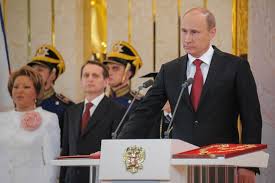 In 1918, US President Woodrow Wilson said that for one year he had been "sweating blood" under the Russian question. According to Woodrow Wilson: A Life for World Peace, he wrote to the House: "I have been sweating blood over the question what is right and feasible to do in Russia. It goes to pieces like quicksilver under my touch, but I hope I see and can report some progress presently, along the double line of economic assistance, and aid to the Czecho-Slovaks".
In 1918, US President Woodrow Wilson said that for one year he had been "sweating blood" under the Russian question. According to Woodrow Wilson: A Life for World Peace, he wrote to the House: "I have been sweating blood over the question what is right and feasible to do in Russia. It goes to pieces like quicksilver under my touch, but I hope I see and can report some progress presently, along the double line of economic assistance, and aid to the Czecho-Slovaks".
About a century later, another Democrat President, Barrack Obama, is facing the notorious Russian question. But his predicament appears to be more pronounced than that of the chief architect of the League of Nations because not only is he finding it extremely difficult to articulate the most appropriate US response to a situation in the former Soviet Union, he has also failed to provide an astute policy reset to historic popular uprisings in the Middle East and North Africa following the outbreak of the Arab Spring. That Syria has emerged as the most profound challenge to the US policymaking in recent years is a fact that has woefully added to Washington's task in relation to the Russian question because the Syrian cauldron simmers menacingly in a country that is hardly at a 21-hour drive from southern Russia.
Unlike 1918 when the Bolsheviks already embroiled in the Russian civil war were renouncing Russia's claims on Poland, Finland, Estonia, Latvia, Belarus, Ukraine and Lithuania, the post-Soviet Union Russia under Vladimir Putin is perhaps reading from a script through which history threatens to repeat itself more as a farce than a tragedy. President Wilson had found "certainty of rectitude" to safely recover Czecho-Slovaks from the clutches of the Bolsheviks through modest American aid purportedly directed at "limited goals". Unfortunately, however, the US became a party to the Russian civil war despite President Wilson's arguably pious intentions that he had already conveyed through a memorandum to the Allies that the US did not seek to involve itself in the domestic Russian affairs or invade Russian sovereignty.
That the US has stepped up its pressure on Russia in recent days through a set of measures, including suspension of military co-operation with Moscow and its plans to expand military ties with Poland and Baltic states, is a key development in the ongoing crisis in the former Soviet Union. How ironic, however, it is that while putting on hold all military engagements and co-operation between the US and Russia, the Pentagon insists that President Obama is not contemplating a military confrontation with Russia; these remarks clearly resonate with those of President Wilson that he outlined in his famous memorandum to the Allies. The present-day "Allies", the European Union (EU), has worked out a massive financial package for Ukraine following G-7's (another euphemism for the "Allies"?) expression of determination to support Ukraine's battered economy.
Both Belarus and Ukraine constitute an integral part of Russia's foreign policy in its 'near abroad' mainly because of the fact that the trio-Russia, Ukraine and Belarus-signed the deal declaring the Soviet Union "has ceased to exist". A flight delay ostensibly caused by inclement weather frustrated Nursultan Nazarbayev's plan to join Boris Yeltsin and the Presidents of Belarus and Ukraine on that one of the most momentous occasions of the 20th century. Unlike Ukraine, however, the status of Russian as an official language in Kazakhstan has faced no formidable challenge since the break-up of the Soviet Union because, according to 2009 census, only 64 percent of Kazakhstan's 16.5 million population speak Kazakh against 94 percent who understand Russian.
That Putin admires Stalin is no secret; it had never been. According to him, it was Stalin who "at least protected and preserved the boundaries of our country". It was during his presidency that Stalinism found a quiet refuge and a new voice in Belarus where most of the statutes of the Stalin era removed from Russia's public places were said to be shipped. In return for preservation of the Cold War relics and its strongman Alexander Lukashenko's unfailing allegiance to the Kremlin, Moscow provided Minsk economic aid particularly in the shape of cheap oil and gas. Russia claims to have made subsidised gas supplies to Ukraine-a much bigger country than Belarus-but for some different reasons. - To be continued
(The writer is newspaper's News Editor. The newspaper carried the second part of this series on the eleventh-hour cancellation of Vladimir Putin's scheduled visit to Pakistan in 2012. He's also the author of a 49-article series on the Arab Spring "Arab Unrest: Perspectives" www.brecorder.com).
Business Recorder




